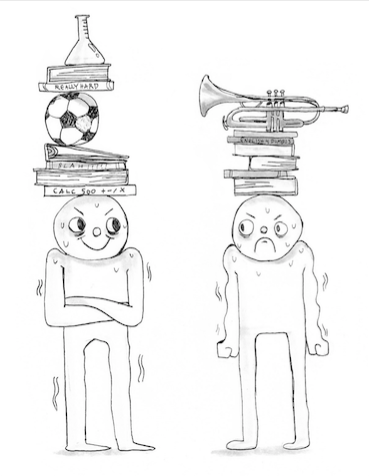Illustration by Anya Chytrowski
The reputation that high school has of being a stressful and terrible time proves true for many at Berkeley High School (BHS). While BHS can be a great place socially, there is no denying that many find the educational environment stressful. The unfriendly atmosphere was not created by the administration. Rather, the source is really the students expectations for themselves. These expectations foster an environment in which students flaunt their stress and lack of sleep.
Why students talk so much about being stressed is multifaceted. In the first place, people think they should be stressed. I have never heard a student say, “Wow, I am just so relaxed.” If someone isn’t stressed they are not saying it, because if you’re not stressed, the assumption is that you’re lazy. Second, a lot of students genuinely are stressed out. High school on its own is hard, but extracurriculars such as sports, clubs, arts, test-prep, and jobs compound that. Juggling commitments is a daunting responsibility. Those who are stressed tend to talk about it, as talking about their experiences with friends and teachers is a great way to cope. Others talk about their stress because the more stress you claim, the more work it seems like you are doing.
Stress largely stems from the competitive atmosphere in many of our classes. Competitive classrooms lead to grade-sharing, which perpetuates the way people compare themselves to their classmates. Rather than doing their personal best, they want to do the best out of everyone in their class. People determine their success not based on their performance, but on whether they outperform their classmates.
Stress in our schools is a pressing issue. Safe learning environments that foster learning require students to be relaxed. Stressed students are less likely to have positive relationships with their teachers, and can even end up skipping school. Chronic stress, caused by prolonged emotional pressures, can lead to headaches and loss of sleep.
The problem of stress isn’t always the teacher’s fault. In Advanced Placement classes, teachers must teach the curriculum by the day of the test in order to prepare their students, not just to torture them. On the other hand, assigning work with little educational value (busy work), is a stress-inducing decision made by the teacher. An open dialogue between teachers and students can lead to teachers tailoring their practices to help their students and reduce stress.
Stress may be inevitable in high school, but flaunting stress and grade-sharing furthers an unfriendly competitive culture, and makes stereotypes come true. By working together we can support each other rather than compete against each other, and make it through this academically hard part of our lives.


